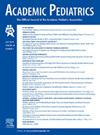儿科住院医师对如何教授新生儿健康不平等的观点:一项多站点探索性研究。
IF 2.8
3区 医学
Q1 PEDIATRICS
引用次数: 0
摘要
目的:研究儿科住院医师对新生儿健康不平等的看法和教育,从而确定改善新生儿健康不平等的培训需求和机会。方法:我们进行了一项经irb批准的多机构定性研究。在18个月的时间里,我们在湾区的机构进行了10次焦点小组讨论。我们利用文献综述、专家共识和卫生公平专家的反馈制定了焦点小组指南。对焦点小组的发言进行录音并逐字抄录。我们使用主题分析来编码转录本和发展主题,直到达到主题充分性,使用反身性和成员检查。结果:44名儿科住院医师焦点小组参与者出现了五个关键主题。1)住院医师关注新生儿不平等如何影响患者预后,由于系统层面的障碍和有限的行动导向知识,他们发现很难实时解决这些问题。2)住院医生表现出高度的道德困扰和认知失调,因为他们认为自己无法完全解决临床环境中的不公平现象,并寻求一个安全的空间来交流这些情绪。3)住院医师希望在住院期间有时间进行纵向反思和以行动为导向的不平等教育。4)住院医师强调教师角色塑造他们的知识和解决不平等问题的方法的重要性,强调了教师持续发展的必要性。5)与多学科护理团队成员、家庭和社区合作伙伴的合作是全面课程的核心。结论:这些发现强调了在儿科培训中加强以行动为基础的健康公平教育的必要性。解决这些确定的主题可以改善住院医师的准备工作,以减轻新生儿护理方面的健康差距,促进新生儿的公平结局。本文章由计算机程序翻译,如有差异,请以英文原文为准。
Pediatric Resident Perspectives on How to Teach About Neonatal Health Inequities: A Multisite Exploratory Study
Objective
To examine pediatric residents’ perspectives and education on neonatal health inequities, thereby identifying training needs and opportunities to improve health inequities for newborns.
Methods
We performed an Institutional Review Board (IRB)-approved multi-institutional, qualitative study. Over 18 months, we conducted 10 focus groups across Bay Area institutions. We developed focus group guides using literature review, expert consensus, and feedback from health equity experts. Focus groups were audio-recorded and transcribed verbatim. We used thematic analysis to code transcripts and develop themes until reaching thematic sufficiency, employing reflexivity and member checking.
Results
Five key themes emerged across 44 pediatric resident focus group participants. 1) Residents spotlight how neonatal inequities influence patient outcomes, finding difficulties in addressing them in real-time due to systems-level barriers and limited action-oriented knowledge. 2) Residents express a high level of moral distress and cognitive dissonance over the perceived inability to fully address inequities in the clinical setting, seeking a safe space to communicate these emotions. 3) Residents desire protected time for longitudinal reflection and action-oriented education about inequities throughout residency. 4) Residents emphasize the importance of faculty role modeling their knowledge and approach to addressing inequities, highlighting a need for ongoing faculty development. 5) Collaboration with multidisciplinary care team members, families, and community partners is central to a well-rounded curriculum.
Conclusions
These findings underscore the need to enhance action-based health equity education in pediatric training. Addressing these identified themes can improve resident preparedness to mitigate health disparities in neonatal care, fostering equitable outcomes for newborns.
求助全文
通过发布文献求助,成功后即可免费获取论文全文。
去求助
来源期刊

Academic Pediatrics
PEDIATRICS-
CiteScore
4.60
自引率
12.90%
发文量
300
审稿时长
60 days
期刊介绍:
Academic Pediatrics, the official journal of the Academic Pediatric Association, is a peer-reviewed publication whose purpose is to strengthen the research and educational base of academic general pediatrics. The journal provides leadership in pediatric education, research, patient care and advocacy. Content areas include pediatric education, emergency medicine, injury, abuse, behavioral pediatrics, holistic medicine, child health services and health policy,and the environment. The journal provides an active forum for the presentation of pediatric educational research in diverse settings, involving medical students, residents, fellows, and practicing professionals. The journal also emphasizes important research relating to the quality of child health care, health care policy, and the organization of child health services. It also includes systematic reviews of primary care interventions and important methodologic papers to aid research in child health and education.
 求助内容:
求助内容: 应助结果提醒方式:
应助结果提醒方式:


